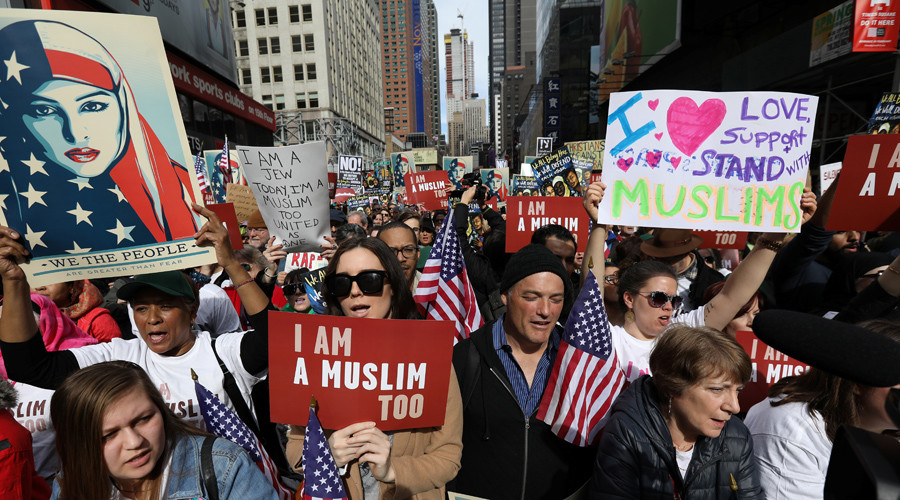www.aljazeerah.info
Opinion Editorials, February 2017
Archives
Mission & Name
Conflict Terminology
Editorials
Gaza Holocaust
Gulf War
Isdood
Islam
News
News Photos
Opinion Editorials
US Foreign Policy (Dr. El-Najjar's Articles)
www.aljazeerah.info
|
Global Entry Privileges for Muslim-American Travelers Are Quietly Revoked By Abdus Sattar Ghazali Redress, Al-Jazeerah, CCUN, February 21, 2017 |
 |
 |
|
| Americans protesting Trump's Islamophobia, New York, February 19, 2017 |
The Seven-million strong American Muslim community, on the receiving end
since the ghastly terrorist attacks on 9/11/2001, has ostensibly become
target of President Trump's policies.
While the January 27 travel ban may still be affecting American Muslim
citizens,
some Muslim travelers outside the seven countries targeted by the
controversial ban, including naturalized U.S. citizens and green card
holders, are indicating that their Global Entry status has been revoked.
Global Entry is a program run by U.S. Customs and Border Protection (CBP),
which provides expedited entry through customs checkpoints at U.S. airports
to vetted travelers.
Mic.com has quoted the Immigration lawyers as saying that U.S. Customs and
Border Protection (CBP) is revoking Global Entry status for their clients.
Skift.com has also reported the same.
According to Mic, lawyers are currently trying to decipher the pattern
regarding the cancellation of Global Entry and TSA Precheck status for many
Muslim-American travelers.
Skift’s reporting backs up this pattern. Business travelers indicated to
Skift that corporate visa vendors are alerting clients that Muslim men
between the ages of 18 and 49 may be affected.
One individual, who became a naturalized U.S. citizen while in middle
school, was suddenly informed via email that his Global Entry status had
been revoked, according to Skift. The CBP stated that his status has been
revoked for the following reason: “You do not meet the program eligibility
requirements.” He had first received Global Entry certification in 2012 an.
Mic reported that Greg Siskind, attorney and board member of the American
Immigration Lawyers Association, has been leading the charge in
investigating these cases and called for examples on Twitter in early
February. "So far, we have heard from eight to nine people who are all
Muslim," he said. "We expect that number to grow."
According to Siskind, though, the revocations extend beyond the countries
targeted on the ban list — Syria, Yemen, Iran, Iraq, Somalia, Sudan and
Libya — and has even affected American citizens.
Heena Musabji, a Chicago-based attorney, said in a phone interview she's
heard of three cases since the start of Trump's travel ban in which Muslim
U.S. citizens were denied Global Entry without explanation.
One of Musabji's clients is Hasan Askari, a 30-year-old U.S. citizen who
emigrated from Pakistan in 2003 and later received dual bachelor's degrees
at East-West University in Chicago. As a customer relations officer for a
Chicago-based software company, Askari's profession requires a lot of
traveling, so he applied for Global Entry eligibility in July 2016.
In November, Askari went through CBP's in-person screening and interview
process. He was told he was approved and would receive his card in the mail,
but in February — after Trump's travel ban was put into effect — Askari
received an email from CBP notifying him of a change in his Global Entry
eligibility status. He later learned he was denied.
Muslim Legal Clinic
Not surprisingly, Legal Clinic Coordinator of the Muslim Community
Association of the San Francisco Bay Area (MCA) has given the following
advice to the potential travelers:
As a U.S. Citizen you should have no problems traveling and, barring an
extreme circumstance, legally you cannot be denied entry into the U.S.
It is your decision whether to travel or not. Should you decide to travel, I
have a few tips from our recent workshop that might make your travels
easier:
-
Before you travel, inform your U.S. family/friends & an immigration
attorney of your arrival details (airlines, flight number, & arrival
time) so they are ready to assist you at the airport.
- Your attorney may suggest to carry a signed Form G-28 (Notice of Entry of Appearance as Attorney or Accredited Representative) and a legal opinion letter that states the basis for your reentry into the U.S.
-
Be
sure to have the phone numbers of immigration attorneys, non-profit
organizations, etc. on hand in case you have trouble at the port of
entry.
-
Upon
arrival, be prepared for secondary inspection for further questioning.
-
Remember, you should answer questions about the purpose of your trip,
how long you were gone for, and what countries you visited.
-
Questions about religious beliefs and political views are not
appropriate.
-
Be
prepared:
-
For requests to search your electronic devices (such as your
phone, tablet, laptop, flash drives, camera, etc.)
-
For requests to search your emails & social media accounts (such
as Facebook/Twitter)
-
For requests for your usernames & passwords to your devices &
accounts
- U.S. citizens cannot be refused entry for refusing to provide this information, but refusing this information may result in delays, lengthy questioning, and/or officers seizing your device for further inspection.
-
For requests to search your electronic devices (such as your
phone, tablet, laptop, flash drives, camera, etc.)
Abdus
Sattar Ghazali is the Chief Editor of the Journal of America (www.journalofamerica.net)email:
asghazali2011( @) gmailcom
Share the link of this article with your facebook friends
|
|
|
|
||
|
||||||


